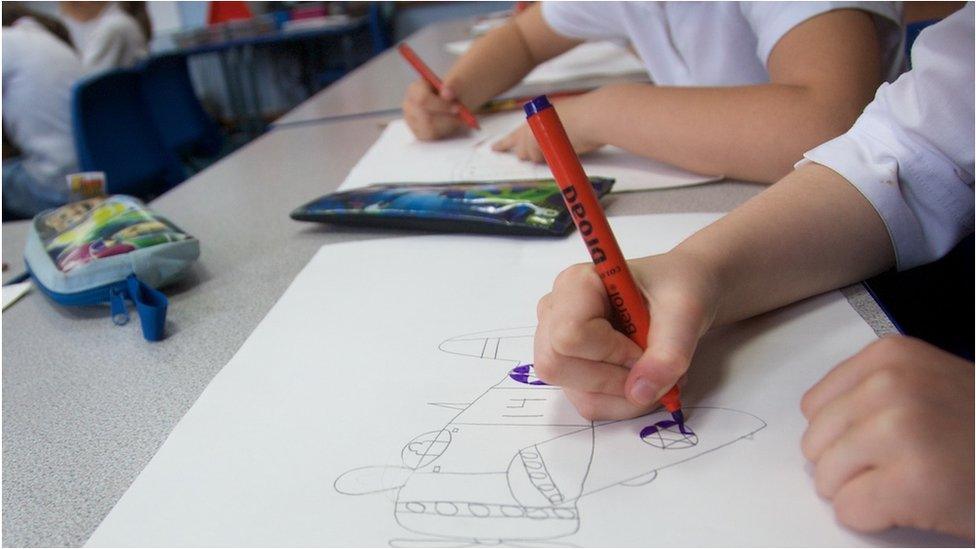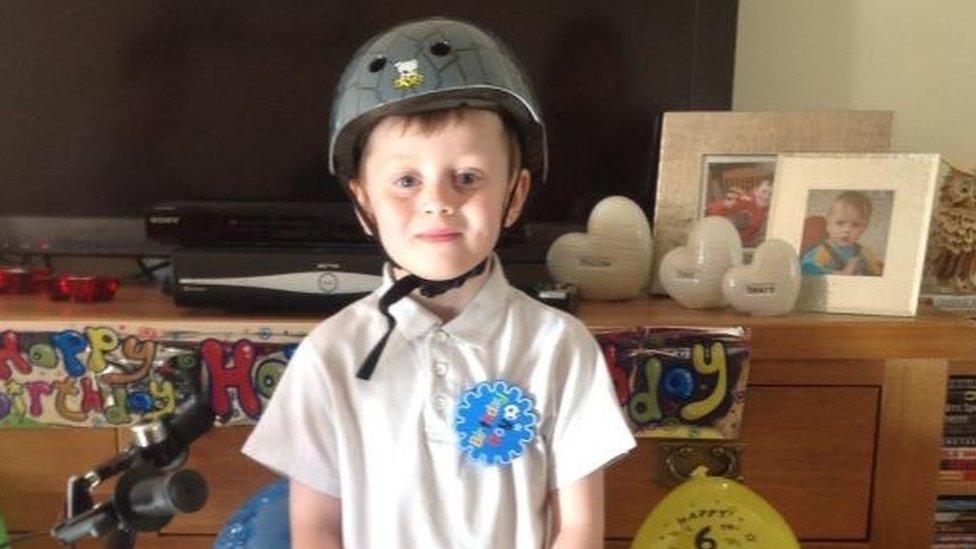Campaign launched targeting child restraint in schools
- Published

Enable Scotland wants stricter protocols on the use of restraint and seclusion in schools
Campaigners have called for stricter rules around the use of restraint and seclusion in schools.
Enable Scotland said the current system was putting children at risk of physical and psychological harm.
It wants more staff who are trained in supporting positive behaviours in classrooms following 2,674 incidents reported incidents last year.
The Scottish government said it was investing £15m in additional support for learning assistants.
According to Enable, which provides advocacy for people with learning disabilities, children in Scotland are often put at risk due to unregulated, unsupported and unacceptable practices in schools - with limited routes of redress for parents.
Its latest report, In Safe Hands?, external claimed the current system denied children their rights under the United Nations Convention on the Rights of the Child.
Enable said Scotland's local authorities recorded 2,674 incidents of restraint and seclusion relating to 386 children during 2017/2018.
But it added that the figure did not paint the picture, as 10 out of 32 local authorities failed to provide data.

'I was made to feel like I was imagining things'

Daniel Gourlay, now 12, pictured around the time he was first restrained according to his mother Barbara
Daniel Gourlay from Inverness was five years old when he was first physically restrained at school by his teachers.
Now 12, and with a diagnosis of autism spectrum disorder and Pathological Demand Avoidance (PDA) disorder, his mum Barbara said she has lost count of the number of times he has been restrained.
She said: "I knew that something wasn't quite right with Daniel when he was about 18 months old. I have two older children and as a mum I just knew, but healthcare professionals made me feel like I was imagining things saying instead that he was going through the terrible twos or had separation anxiety.
"His dad died when he was five, so it coincided with the trauma he felt then too - but still I knew and yet no one listened."
Daniel was diagnosed with autism and PDA, when he was nine, by which time Barbara says he had been labelled as a "bad kid" and a "lost cause" at school.
Barbara, who is supporting Enable's campaign, added: "It's heartbreaking, especially when you know that it's their human right to have an education, to feel safe and to feel that the adults around them care about them as an individual."

The charity has called on members of the public to contact their MSPs, urging them to support the campaign and share content online.
Enable has also called on the Scottish government to take action, including:
Stronger, dedicated guidance on the use of restraint and seclusion in schools
The rollout of positive support strategies and training in every school and setting a minimum of two trained staff members on site at all times
A duty of candour to be introduced around the reporting of restraint and seclusion incidents at schools
A working group identify a single agency to take responsibility for restraint and seclusion in schools
'Collective shame'
Enable's director of external affairs, Jan Savage, said: "In the 21st century, every child should go to school knowing they are safe from physical and psychological harm.
"They should feel welcome, listened to and be treated with respect from the moment they enter the school gates. To our collective shame, this is not the case for every child in Scotland.
"We also want to see the nomination of a single agency to lead on confronting this issue, including the need for accurate and timely reporting of incidents."
The report heard from a number of parents and carers on the impact on the mental wellbeing and development of children.
One parent told how a young girl was locked in a "safe space" for 45 minutes where she soiled herself. The incident only came to light after another pupil wrote about the incident.
The girl, now 17, is at a different school but remains on anxiety medication.
Enable said their campaign takes on the work by the Children's Commissioner to ensure that Scotland complies with the UN's Convention on the Rights of the Child, which explicitly bars actions such as restraint and seclusion.
A Scottish government spokeswoman said: "National guidance is very clear that physical intervention, restraint and supported isolation seclusion should only ever be used as a last resort, when in the best interests of the child and never for disciplinary purposes.
"Every intervention should be carefully monitored and reviewed - and any unlawful use of physical intervention and seclusion is completely unacceptable."